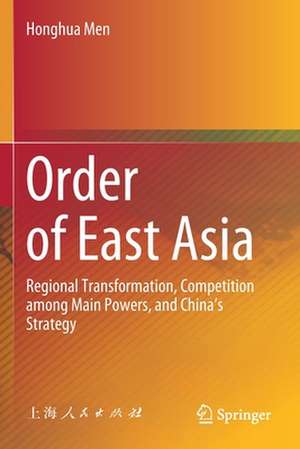Order of East Asia: Regional Transformation, Competition among Main Powers, and China’s Strategy
Autor Honghua Menen Limba Engleză Paperback – 6 iun 2021
| Toate formatele și edițiile | Preț | Express |
|---|---|---|
| Paperback (1) | 640.24 lei 6-8 săpt. | |
| Springer Nature Singapore – 6 iun 2021 | 640.24 lei 6-8 săpt. | |
| Hardback (1) | 646.43 lei 6-8 săpt. | |
| Springer Nature Singapore – 6 iun 2020 | 646.43 lei 6-8 săpt. |
Preț: 640.24 lei
Preț vechi: 753.22 lei
-15% Nou
Puncte Express: 960
Preț estimativ în valută:
122.51€ • 128.17$ • 101.77£
122.51€ • 128.17$ • 101.77£
Carte tipărită la comandă
Livrare economică 02-16 aprilie
Preluare comenzi: 021 569.72.76
Specificații
ISBN-13: 9789811546563
ISBN-10: 9811546568
Ilustrații: XIII, 276 p. 13 illus., 9 illus. in color.
Dimensiuni: 155 x 235 mm
Greutate: 0.41 kg
Ediția:1st ed. 2020
Editura: Springer Nature Singapore
Colecția Springer
Locul publicării:Singapore, Singapore
ISBN-10: 9811546568
Ilustrații: XIII, 276 p. 13 illus., 9 illus. in color.
Dimensiuni: 155 x 235 mm
Greutate: 0.41 kg
Ediția:1st ed. 2020
Editura: Springer Nature Singapore
Colecția Springer
Locul publicării:Singapore, Singapore
Cuprins
Chapter 1 Logic of Regional Order Construction.- Chapter 2 Historical Legacy of East Asian Order.- Chapter 3 Momentum and Prospects for East Asian Order.- Chapter 4 China’s Strategy Towards East Asian Order.
Recenzii
“The book is an important contribution to the history of the development of order in East Asia and understanding the US and China’s core strategic objectives in East Asia, as well as the future trajectory of US–China relations in Asia.” (Behzad Abdollahpour, Asian Affairs, Vol. 53 (1), March, 2022)
Notă biografică
Men Honghua, was born in October 1969. He received his B.A. in literature from Shandong University in 1991, M.A. in Intercultural communication from Peking University in 1998, and Ph.D. in international relations from Peking University in 2001. He was a post-doctoral fellow at Tsinghua University from 2002 to 2004, and selected as associate professor in 2003 and full professor in 2005 by the Central Party School. In 2015, he was designated as a Distinguished University Professor of Tongji University. He is now president of the Institute of World & China Studies, and dean of the School of Political Science and International Relations, Tongji University. Professor Men was Kimsey Fellow of Carnegie Endowment for International Peace in 2003, a visiting professor at Taiwan Chengchi University in 2005, Nikkei Asia Economist at the Japan Center for Economic Research from 2006 to 2007, senior Eisenhower fellow in 2011, Oxford University Chevening Scholar from 2013 to 2014, and Tokyo UniversityJapan Foundation Scholar in 2015. Professor Men has published 52 books and more than 150 articles in leading journals, including Social Sciences in China.
Textul de pe ultima copertă
This book describes the past, present and future of East Asian order, and analyzes how China, Japan, the U.S and ASEAN play important roles in the transformation of East Asian order, and discusses the new logic of regional order formation in the era of globalization and regional integration. The book analyzes China’s relationship with East Asian order, great powers and regional institutions involved, especially bilateral relations between China and Japan, China and the U.S., China and ASEAN, and explores how China could improve its regional strategy. Addressing a hot topic in world politics from the angle of regional order, and using methods such as historical analysis, comparative analysis, quantitative analysis and case study, this readable book enables readers to develop an understanding of the history and status quo of East Asia and China’s role in the region.
Caracteristici
Explores why East Asia is so important in the world Explains the logic of regional order formation Discusses the historical legacies of East Asian order Examines whether the U.S., Japan and ASEAN could maintain some kind of power balance in East Asia Describes how China’s Strategy of East Asia has evolved and what its spillover effects towards other powers in the region will be
